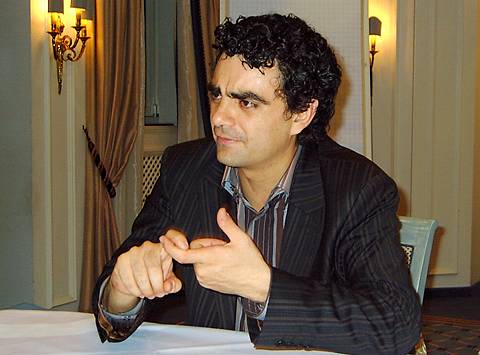|
<< -- 3 -- Tess Crebbin IT'S IN YOUR BLOOD

RV: If you are looking for a story about some horrible hidden drama in my life, I am sorry I cannot give you that. The answer is a lot more pragmatic and it is related to my singing. It all started when my wife, who is a psychologist now, said to me that I would benefit from psychoanalysis. I didn't know what she was talking about and said: 'Why, I don't have any big problems.' So her answer was very wise. She said 'true, but I see a lot of potential in you that you are not letting unfold, a lot of talent that lies dormant. Psychoanalysis is a good investment that will allow you to grow in any field that you can be good at.'
TC: So how exactly can that help your voice now?
RV: This has to do with finding and maintaining your independence, something that I consider to be very important for a singer. As you know, I have had a lot of good teachers. They were all baritones and they all taught me very important aspects about my voice. Then came a time when I was without a teacher, which is a very scary thing to happen early on in your career. As a singer, your instrument is your voice and in the early stages you still don't understand your instrument and what to do with it. Eventually I found this wonderful teacher, the baritone Gabriel Mijares, and he taught me the technique I needed. When I finished work with him, I understood there are people who can guide you and advise you but that it's you who are responsible for your instrument.
We are unique as singers because our instrument is in our throat, and how that instrument sounds has to do with your physical constitution, your psychological development and your type of voice that you have been given. There is only one person capable of playing the instrument in your throat and that is you. So it follows that the only person who can teach you how to play that instrument at high level is also you because there is nobody who understands it better. We all need teachers at the beginning, of course. It's impossible to just go out there and discover by yourself all the things you need to when you first set out to become an opera singer. But once you have done this, then you have to undergo a very important journey of inner development to understand yourself and your instrument, how you produce sounds and how you fill them. You can have some ears there to tell you how you sound to the audience, because that is something you can never know and not even a recording can tell you that, but you are the one who makes the decisions and it's very important to be free in that.
When you have a teacher and you trust that person completely, it fosters dependence and takes responsibility away from you. So the goal of psychoanalysis is to make you free and to give you liberty, to cut the umbilical cord from everything. The problem is that we all keep seeking people we can depend on. We look for father figures, mother figures and so on, seeking security outside ourselves. But you have to be free of all that dependency.
As a singer, you have to have that freedom. You have to trust your instrument and yourself in how to handle it. You can follow the advice of some people but there is only one person who can hold it all together, and that is you. So I am responsible for my voice and its development. I accept that responsibility and work on it very carefully. Psychoanalysis helps me with that.
TC: Interesting. But isn't that fostering dependence of a different kind, on an analyst?
RV: The psychoanalytic process does not work like that. Most of the time I just talk and the psychoanalyst asks me guiding questions to make sure that I stay focused and do not run away from the inner monsters that I need to face. By bringing out in the open what I perceive to be a problem and talking about it, the problem becomes smaller. There will always be monsters in my jungle, as there are in anyone's, but while I thought before that they are big nasty dinosaurs, psychoanalysis shows me that they are not dinosaurs, they are small beasts and I can turn to face them and touch them.
TC: You still do psychoanalysis now ...
RV: Four times a week, 45 minutes a session. Because my analyst is in Mexico, we do our sessions by phone. I just find a quiet place, wherever I am in the world, and I call him. I talk about everything that is going on: music, awards, or my family ... In fact, the success I have today I owe, first and foremost, to my wife who believed in me always, and to my psychoanalyst who assisted me in unfolding my true potential.
TC: In your unfolding process, did you ever think you'd have rather been a baritone? Your teachers were all baritones and even your tenor voice has a distinct baritonal touch to it ...

Rolando Villazon. Photo © 2004 Phil Crebbin
|
RV: Heavens, no. I want the heights and B natural is where I most like to be. I don't know what would have happened in my life as a baritone. There are wonderful parts for baritone, true, Rigoletto, Don Giovanni, Simon Boccanegra. But my idol was Domingo. It's not in your voice. It's in your blood. You are born a tenor.
| 
